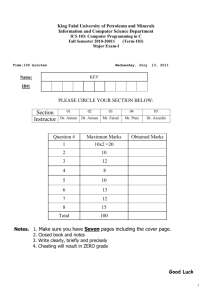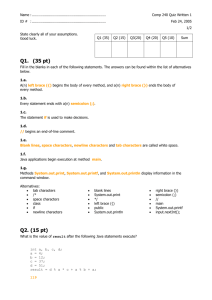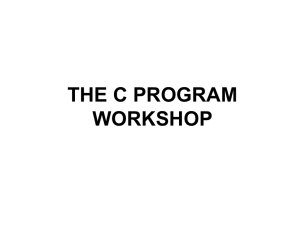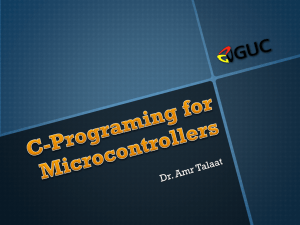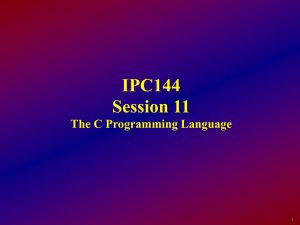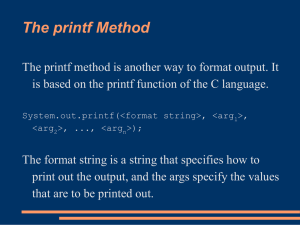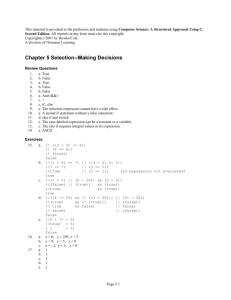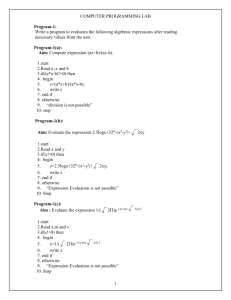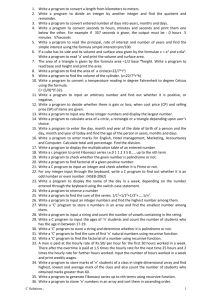Couple Notes about Boolean Expressions in C
advertisement
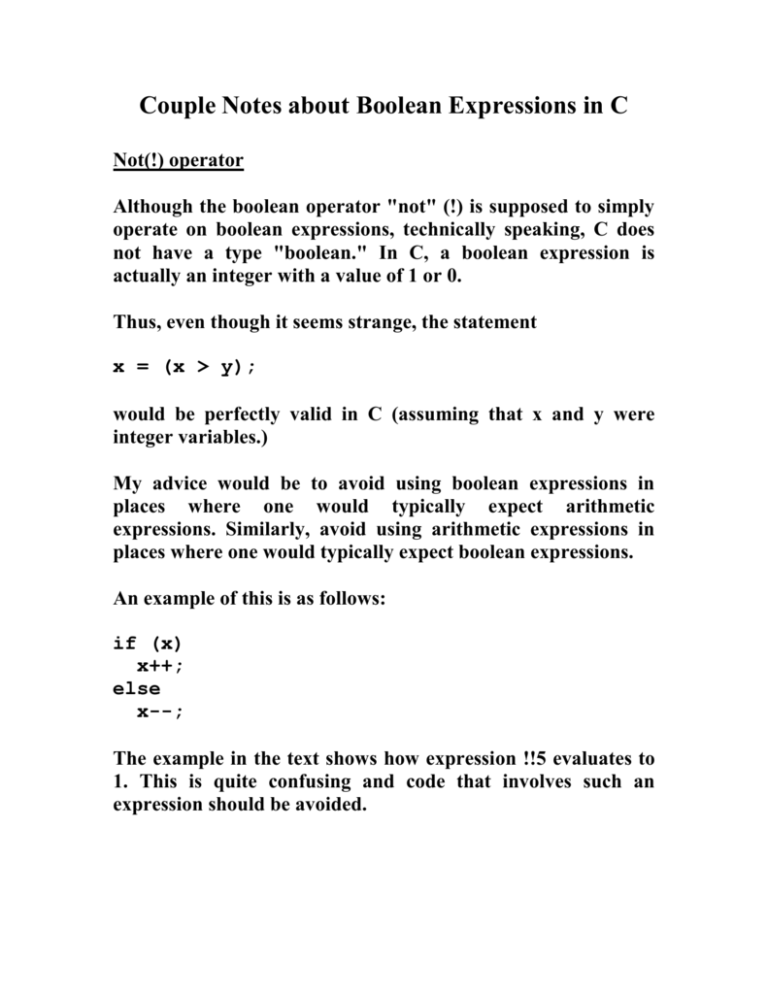
Couple Notes about Boolean Expressions in C
Not(!) operator
Although the boolean operator "not" (!) is supposed to simply
operate on boolean expressions, technically speaking, C does
not have a type "boolean." In C, a boolean expression is
actually an integer with a value of 1 or 0.
Thus, even though it seems strange, the statement
x = (x > y);
would be perfectly valid in C (assuming that x and y were
integer variables.)
My advice would be to avoid using boolean expressions in
places where one would typically expect arithmetic
expressions. Similarly, avoid using arithmetic expressions in
places where one would typically expect boolean expressions.
An example of this is as follows:
if (x)
x++;
else
x--;
The example in the text shows how expression !!5 evaluates to
1. This is quite confusing and code that involves such an
expression should be avoided.
Short-Circuit Evaluation
When a C compiler encounters complex boolean expressions
involving either && or ||, it attempts to do as little work as
possible. For example, consider the following sequence of
statements:
int x, y;
x = 3;
y = 2;
if ((x > 0) || (y < -1))
printf("The statement is true.\n");
The compiler evaluates the expression inside of the if statement
from left to right and first determines that (x>0) is true. Then
it sees that it is supposed to calculate the value of true "or"
another expression. Regardless of whether that other
expression is true or not, it's clear that the overall expression is
true.
Since this is the case, the compiler never even TRIES to
evaluate the second expression, it simply skips doing so and
moves onto the printf.
Similarly, if a boolean expression is the and of two smaller
expressions, if the first is false, the second is never even
evaluated. Although this seems like a trivial detail, in some
situations (in later examples), it will help us to shorten our code
and avoid run-time errors.
Compound and Empty Statements
I mentioned a block of statements in reference to the ifstatement in the last lecture. A block of statements is simply
denoted by matching curly braces:
{
stmt1;
stmt2;
...
stmtn;
}
Typically, we will indent all the statements that are part of a
block of statements. Syntactically, C treats a block of
statements as a single statement. This is how we can get more
than one line of code executed if the boolean expression in an if
statement is true.
The empty statement is simply denoted by a semicolon and
does nothing:
;
A valid example of the use of this statement is as follows:
if (x == 7)
;
else
printf("Hello World.\n");
The empty statement is hardly ever necessary. (You can write
code without it that does the same thing.)
If Statement Example
Write an short C program (without comments) that reads in
the dimensions of a room (length x width) and also reads in the
size of a desk (length x width) and determines if the desk can
fit in the room with each of it’s sides parallel to a wall in the
room. (This simply precludes the possibility of placing the desk
diagonally. The problem becomes much more difficult if you
allow this.) Assume the user enters positive numbers for each
of the four dimensions.
#include <stdio.h>
int main() {
int roomlen, roomwid;
int desklen, deskwid;
printf("Enter the length and width of the room.\n");
scanf("%d%d",&roomlen, &roomwid);
printf("Enter the length and width of the desk.\n");
scanf("%d%d",&desklen, &deskwid);
if ((deskwid <= roomwid) && (desklen <= roomlen))
printf(“The desk will fit in the room.\n”);
else
printf(“The desk will not fit in the room.\n”);
return 0;
}
Will this work in every situation? Why or why not?
Okay, here is my new solution. Will this work?
#include <stdio.h>
int main() {
int roomlen, roomwid;
int desklen, deskwid;
// Read in room and desk dimensions.
printf("Enter the length and width of the room.\n");
scanf("%d%d",&roomlen, &roomwid);
printf("Enter the length and width of the desk.\n");
scanf("%d%d",&desklen, &deskwid);
//Adjust lengths and widths, if necessary
if (roomlen < roomwid) {
roomlen = roomwid;
roomwid = roomlen;
}
if (desklen < deskwid) {
desklen = deskwid;
deskwid = desklen;
}
// Compare corresponding dimensions and output result.
if ((deskwid <= roomwid) && (desklen <= roomlen))
printf(“The desk will fit in the room.\n”);
else
printf(“The desk will not fit in the room.\n”);
return 0;
}
Here is my final version, taking into account the correct way to
swap the value of two variables.
#include <stdio.h>
int main() {
int roomlen, roomwid;
int desklen, deskwid;
int temp;
// Read in room and desk dimensions.
printf("Enter the length and width of the room.\n");
scanf("%d%d",&roomlen, &roomwid);
printf("Enter the length and width of the desk.\n");
scanf("%d%d",&desklen, &deskwid);
//Adjust lengths and widths, if necessary
if (roomlen < roomwid) {
temp = roomlen;
roomlen = roomwid;
roomwid = temp;
}
if (desklen < deskwid) {
temp = desklen;
desklen = deskwid;
deskwid = temp;
}
// Compare corresponding dimensions and output result.
if ((deskwid <= roomwid) && (desklen <= roomlen))
printf(“The desk will fit in the room.\n”);
else
printf(“The desk will not fit in the room.\n”);
return 0;
}
Here is another way to solve the same problem:
#include <stdio.h>
int main() {
int roomlen, roomwid;
int desklen, deskwid;
int temp;
// Read in room and desk dimensions.
printf("Enter the length and width of the room.\n");
scanf("%d%d",&roomlen, &roomwid);
printf("Enter the length and width of the desk.\n");
scanf("%d%d",&desklen, &deskwid);
// Check both ways of putting the desk in the room and
// output the result.
if ((deskwid <= roomwid) && (desklen <= roomlen))
printf(“The desk will fit in the room.\n”);
else if ((deskwid<=roomlen) && (desklen<=roomwid))
printf(“The desk will fit in the room.\n”);
else
printf(“The desk will not fit in the room.\n”);
return 0;
}
Switch Statement
This statement, just like the if statement, allows for conditional
execution. The general construct is as follows:
switch (<integer expression>) {
case <value1>:
<stmts1>
break;
case <value2>:
<stmts2>
break;
...
default:
<stmtsn>
}
stmtA
The manner in which this expression is evaluated is as follows:
1) The integer expression is evaluated.
2) If this expression is equal to value1, then <stmts1> are
executed and the break statement carries the execution to
stmtA.
3) Otherwise, each value is compared th the integer expression
value until one is found to match. At that point, the
corresponding set of statements is executed and then the break
carries execution to stmtA.
4) If no listed value is equal to the value of the expression, then
the default case is executed.
Couple notes: The lists of values may not include ranges of
values, but only single values. Also, the break statements are
not required, but without them, then several cases may get
executed.
This generally limits the use of case statements to situations
where you know an expression will equal one of a few integer
values and based on that want to execute a certain segment of
code. You can emulate a case statement with an appropriate if
statement.
Here is an example of a case statement:
switch (answer) {
case 1:
printf("You have selected #1.\n");
break;
case 2:
printf("You have selected #2.\n");
break;
case 3:
printf("You have selected #3.\n");
break;
default:
printf("Invalid selection.\n");
}
